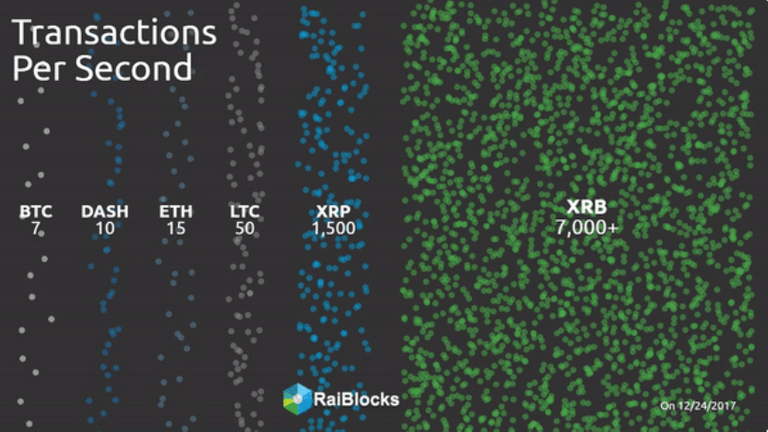RaiBlocks is a currency that has been developed for three years and has enjoyed incredible price gains for a good month. With alternative blockchain approaches, she plans to solve existing problems with other cryptocurrencies. What is this currency and why has it been increasing so heavily lately?*

The rise of RaiBlocks will certainly not have escaped those who regularly visit Coinmarketcap: RaiBlocks only ranked 15th in terms of market value at the beginning of December, the crypto currency is now in 20th place with over 2 billion euros in market capitalization. Within this month, the price, which includes the consolidation of recent weeks by almost 40%, more than increased hundreds of times. What's up with this cryptocurrency and the new interest in it?
RaiBlocks - It does not just have to be a blockchain
RaiBlocks is a blockchain-like system whose origins date back to 2014 and has been continuously evolving ever since. The primary developer is Colin LeMahieu , who had no expertise in terms of blockchain, but worked as a software developer for renowned companies such as Dell or Qualcomm for several years.
In the RaiBlocks network every single user owns his own small blockchain, which is also only updated by him. Accordingly, the blocks of each RaiBlocks blockchain contain no more than one transaction. The individual blockchains are interwoven by the transactions. This network of blockchains is called a block lattice. In terms of structure , this is a directional acyclic graph , similar to IOTA or byteballs .
Nevertheless, a first lengthy synchronization with the blockchain after installing the Wallet is not enough. However, this can be bypassed by downloading much of the database beforehand. However, what changes is that transactions can be asynchronous.
To realize this, a distinction is made between "send" and "receive" transactions. If Alice wants to send money to Bob over the RaiBlocks network, Alice places a "send" transaction in her blockchain. The structure of such a transaction is reminiscent of building a block in the bitcoin block chain, but without a Merkle tree that has many transactions: a hash of the previous block connects to the blockchain. The destination address is used to connect the blockchain to that of Bob.
Even if the amount sent to Bob becomes unavailable after generating a "send" Alice transaction, that amount is marked as "pending" until Bob accepts the transaction. This is done by generating a "Receive" transaction that contains the hash of the source block in addition to the hash that connects the block to its own blockchain.
Since Alice and Bob each build their own blockchain, an asynchronous development of the individual blockchains is possible. Alice can therefore, if she still has coins after the transaction, make one to Carol.
Now it can come to problems, if two blocks have the same origin, so it came to a fork of its own block chain. In the case of a fork, a so-called representative, ie an entity that enjoys the confidence of the owner of the junked blockchain, will make a choice. Other participants in the network can now vote for one of the two blocks, with their vote weighted according to their reputation in the network. After about one minute, one of the two blocks is declared valid according to the election result.
It is not necessary for everyone to participate in this election or to keep the wallet running. He can specify a node other than his representative whose reputation is then measured by the accounts for which that node is a representative.
No scaling problems thanks to Blockchain lattice
Since everyone is primarily concerned with his own blockchain, the transactions are quasi-instantaneous. In addition, since normally no other entity, such as a miner, is needed, there are no transaction fees. RaiBlocks wants to solve the scaling problem with this block lattice, which Bitcoin currently masters but now also employs Ethereum. Pretty nice is the vision of RaiBlocks compared to other crypto currencies represented:
The concern within a large Mempool education is therefore very low on the part of the community. Likewise, there will be no war on transaction fees, as such charges do not even provide for the current protocol.
How did the exorbitant rise come about?
Of course, the current focus on cheap cryptocurrencies plays a big role: this massive increase, followed by a significant price slump, is known from other currencies whose price started at a few euros or even under one euro. In addition, it was announced in late December that was working on mobile wallets and a light wallet, which caused further interest. The main reason, however, is the interest in cryptocurrencies that solve the scaling problem. Both the extremely large transaction fees and the now 179 GB blockchain of Bitcoin let investors look for alternatives. In particular, the lack of transaction fees and the high transaction speed makes many investors hoping
Of course, all this emphasizes that a young cryptocurrency like RaiBlocks still has to prove itself. Currently about 8,000 transactions per day are processed. Of course, there are no problems with the processing of transactions. RaiBlocks will have to prove itself with increasing usage. However, with transactions free of charge, there are voices within the community who are considering deliberately exposing the network to transactional spam to test scalability.
Overall, it is not an uninteresting cryptocurrency that pursues an interesting, new concept. If you want to know more about RaiBlocks, please refer to the website , the white paper , the forum and the Github account of the project.
